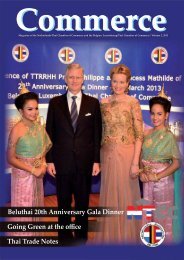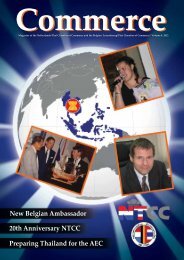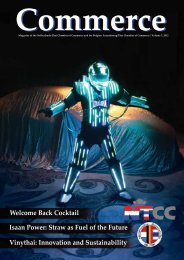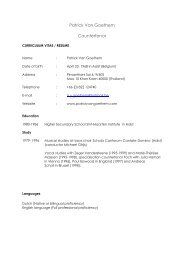the BeLuThai Chamber of Commerce
the BeLuThai Chamber of Commerce
the BeLuThai Chamber of Commerce
Create successful ePaper yourself
Turn your PDF publications into a flip-book with our unique Google optimized e-Paper software.
<strong>Commerce</strong><br />
prospects to find to check your reputation. They can<br />
drive business and talent to (and away from) your<br />
company. Former colleagues may even become future<br />
collaborators: When Joe Chernov, our onetime head<br />
<strong>of</strong> PR, left BzzAgent in 2009, our relationship shifted<br />
but continued to evolve into shared projects, coauthored<br />
thought pieces, ideation sessions, retweets<br />
and Facebook updates. Where our employeeemployer<br />
relationship allowed for one dimension<br />
<strong>of</strong> interaction, our corporate alum relationship had<br />
multiple dimensions <strong>of</strong> interaction and value.<br />
F<br />
Former employees provide<br />
invaluable perspective<br />
They have critical knowledge about your business—<br />
and you—that practically guarantees <strong>the</strong>y’ll always be<br />
beneficial. With <strong>the</strong> knowledge <strong>of</strong> your organization’s<br />
vision in hand, <strong>the</strong>y can provide an incredible<br />
external perspective that is sometimes lost within<br />
<strong>the</strong> confines <strong>of</strong> an inward-facing company. They can<br />
make introductions to a whole new set <strong>of</strong> clients.<br />
They can point you toward competitor information<br />
<strong>the</strong>y’re receiving now that <strong>the</strong>y’re on <strong>the</strong> outside. In<br />
short, <strong>the</strong>ir paycheck may not be determined by your<br />
vision anymore, but as part <strong>of</strong> your network <strong>the</strong>y will<br />
continue to do things that make your vision a reality.<br />
M<br />
Monogamy in corporate America<br />
is dead<br />
We now live in an era where we’re no longer<br />
committed to a single corporate entity for years.<br />
Ra<strong>the</strong>r, it’s common—and even expected—that<br />
people will change jobs and switch careers. But<br />
beyond transitions, it’s expected that employees will<br />
take part in extracurricular business activities such<br />
as joining associations or taking part in Meetups or<br />
Hackathons. It’s accepted that an executive may take<br />
time to advise o<strong>the</strong>r companies or join a board, roles<br />
that only increase <strong>the</strong>ir knowledge and value. Star<br />
employees may collaborate with friends and rivals at<br />
o<strong>the</strong>r companies on community building parties or<br />
events, such as Ruby Riots or 1,000 pirates or even<br />
Tech Proms. It’s not just that you’re connected by sixdegrees<br />
(or less), but ra<strong>the</strong>r that each connection is<br />
likely ano<strong>the</strong>r potential collaboration and learning<br />
opportunity.<br />
Now, more than ever, departing employees should<br />
be treated with care and respect. When <strong>the</strong>y leave,<br />
bosses should thank <strong>the</strong>m for <strong>the</strong>ir time and <strong>the</strong>ir<br />
contributions. In fact, a company’s relationship with<br />
corporate alums should be fostered, beginning at <strong>the</strong><br />
moment that you decide to stop working toge<strong>the</strong>r. It<br />
doesn’t matter who makes that decision. If handled<br />
appropriately, relationships with former employees<br />
can be a source <strong>of</strong> immense, incredible benefits for<br />
both parties. (To Kristen B.: Early at BzzAgent, you<br />
helped us build a fantastic brand and I don’t know<br />
if I told you that enough. Let me tell you that again!)<br />
Some very smart companies figured out <strong>the</strong> value <strong>of</strong><br />
maintaining connections to former employees long<br />
ago. Open Market—one <strong>of</strong> Boston’s high flyers in<br />
<strong>the</strong> late ‘90s—has an alumni group listserv where<br />
people seek advice, share job openings, and create<br />
new relationships. Procter & Gamble famously hosts<br />
a big splashy event for <strong>the</strong>ir alumni every year—and<br />
you can’t get in unless you worked at a certain level<br />
at P&G, which makes it all that more exclusive and<br />
special. IBM, too, is known to go to lengths to make<br />
sure its former employees remain fans.<br />
It’s even possible to maintain good relationships<br />
with employees you have to let go. A few years ago,<br />
due to an evolving business model and economic<br />
depression, we had to do a round <strong>of</strong> lay<strong>of</strong>fs at<br />
BzzAgent. We let go <strong>of</strong> two fabulous employees—<br />
Aaron C. and David E.—who we <strong>the</strong>n <strong>of</strong>fered<br />
workspace in our <strong>of</strong>fice for <strong>the</strong>m to take on <strong>the</strong>ir<br />
next career move. Ano<strong>the</strong>r former employee, Rob T.,<br />
decided he wanted to leave BzzAgent to start his own<br />
company. He now runs ProctorCam, a company that<br />
monitors online test taking, with a dozen employees<br />
inside our <strong>of</strong>fices. Toge<strong>the</strong>r, we all now “cohabitate”<br />
and have generated infinite points <strong>of</strong> value through<br />
hallway dialogue and <strong>the</strong> good-feelings from current<br />
employees understanding how we support our own.<br />
Just a few months ago, ano<strong>the</strong>r key BzzAgent employee<br />
gave notice. But this time—with <strong>the</strong> historical<br />
knowledge in hand <strong>of</strong> nearly 300 employees coming<br />
and going—it was different. First, I congratulated<br />
him on what would likely be an exciting career move<br />
and expressed how much I appreciated everything he<br />
did for us. We <strong>the</strong>n worked toge<strong>the</strong>r to craft a really<br />
solid transition plan, including to whom, and when<br />
we would announce his departure. And in <strong>the</strong> time<br />
between his notice and his exit, we didn’t ostracize<br />
him—ra<strong>the</strong>r, we worked in unison to achieve <strong>the</strong><br />
goals we’d laid out toge<strong>the</strong>r. Ultimately, we threw<br />
him a party and we bought him a bottle <strong>of</strong> Vueve<br />
Clicquot to celebrate our appreciation for <strong>the</strong> value<br />
he provided us. By <strong>the</strong> time he left, our relationship<br />
may have been stronger than any time during our<br />
previous three years working toge<strong>the</strong>r.<br />
So to Dave D.: thanks for everything you did for<br />
BzzAgent as our president for three years. I look<br />
forward to working alongside you again in some<br />
endeavor sometime, somewhere—and let’s share<br />
a pint <strong>of</strong> Brown’s Ale toge<strong>the</strong>r at our upcoming<br />
BzzAgent alumni party.<br />
An article by Dave Balter from Inc. For more<br />
publications by Inc., please visit www.inc.com<br />
22 volume 1, 2012













